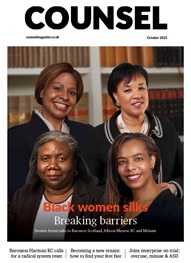*/
Baroness Deech has called for a change in public attitude towards divorce.
In the first of six Gresham College lectures on family law, Divorce Law: A Disaster? , Baroness Deech of Cumnor DBE outlined the cost of divorce in financial and emotional terms, and called for a “new debate on marriage and the family under the umbrella of moral and civic renewal”, although she accepted that it was “unlikely to provide any consensus.” “
Divorce is not a private matter, it is of real public concern and cost, with a ripple effect on the family, the community and the whole country,” she said.
“So public attitudes have to be changed, just as they have been in relation to environmental issues and smoking, with greater or lesser success.”
She recommended that divorcing couples should be made to endure a 12 month waiting period in order to hold or reverse the rise in divorce.
“My own remedy would be an introduction of a waiting period to stop divorce being so quickly granted, even where the ground is one of the speedy ones,” she said.
“I would add to the present grounds of divorce a provision that no decree shall be granted until at least 12 months have elapsed from the service of the petition (the start of the formalities). This would ensure that no petitioner would be free to remarry for at least one year after the beginning of the process, regardless of the reasons for the divorce.”
Baroness Ruth Deech, who is professor of law at Gresham College and Chair of the Bar Standards Board, said that divorce often has a lasting impact on children, yet this is not taken seriously by politicians.
“It is astonishing that no government seriously considers divorce as an issue while expressing anxiety about single parents, their children and society’s health.”
Mediation had “not worked as well as might be hoped” and was unlikely to hold down the rate of divorce, she added.
“Women are reported to feel disadvantaged by mediation.
“This is because mediation seeks a compromise or agreement, and favours the articulate and determined over the cowed and quiet, apparently, and it is said female mediators are more persuaded by husbands’ arguments than wives’”.
She also said that women should “be educated to face [divorce], and it is no solution to the material and psychological problems to expect them all to rely on ex-husbands”.
Baroness Deech’s next speech will take place on 13 October.
Divorce is not a private matter, it is of real public concern and cost, with a ripple effect on the family, the community and the whole country,” she said.
“So public attitudes have to be changed, just as they have been in relation to environmental issues and smoking, with greater or lesser success.”
She recommended that divorcing couples should be made to endure a 12 month waiting period in order to hold or reverse the rise in divorce.
“My own remedy would be an introduction of a waiting period to stop divorce being so quickly granted, even where the ground is one of the speedy ones,” she said.
“I would add to the present grounds of divorce a provision that no decree shall be granted until at least 12 months have elapsed from the service of the petition (the start of the formalities). This would ensure that no petitioner would be free to remarry for at least one year after the beginning of the process, regardless of the reasons for the divorce.”
Baroness Ruth Deech, who is professor of law at Gresham College and Chair of the Bar Standards Board, said that divorce often has a lasting impact on children, yet this is not taken seriously by politicians.
“It is astonishing that no government seriously considers divorce as an issue while expressing anxiety about single parents, their children and society’s health.”
Mediation had “not worked as well as might be hoped” and was unlikely to hold down the rate of divorce, she added.
“Women are reported to feel disadvantaged by mediation.
“This is because mediation seeks a compromise or agreement, and favours the articulate and determined over the cowed and quiet, apparently, and it is said female mediators are more persuaded by husbands’ arguments than wives’”.
She also said that women should “be educated to face [divorce], and it is no solution to the material and psychological problems to expect them all to rely on ex-husbands”.
Baroness Deech’s next speech will take place on 13 October.
Baroness Deech has called for a change in public attitude towards divorce.
In the first of six Gresham College lectures on family law, Divorce Law: A Disaster?, Baroness Deech of Cumnor DBE outlined the cost of divorce in financial and emotional terms, and called for a “new debate on marriage and the family under the umbrella of moral and civic renewal”, although she accepted that it was “unlikely to provide any consensus.” “


Justice system requires urgent attention and next steps on the Harman Review
Q&A with Tim Lynch of Jordan Lynch Private Finance
By Marie Law, Director of Toxicology at AlphaBiolabs
By Louise Crush of Westgate Wealth Management
Why Virtual Assistants Can Meet the Legal Profession’s Exacting Standards
Despite increased awareness, why are AI hallucinations continuing to infiltrate court cases at an alarming rate? Matthew Lee investigates
Many disabled barristers face entrenched obstacles to KC appointment – both procedural and systemic, writes Diego F Soto-Miranda
The proscribing of Palestine Action under the Terrorism Act is an assault on the English language and on civil liberties, argues Paul Harris SC, founder of the Bar Human Rights Committee
For over three decades, the Bar Mock Trial Competition has boosted the skills, knowledge and confidence of tens of thousands of state school students – as sixth-form teacher Conor Duffy and Young Citizens’ Akasa Pradhan report
Suzie Miller’s latest play puts the legal system centre stage once more. Will it galvanise change? asks Rehna Azim